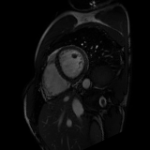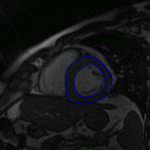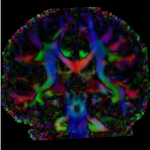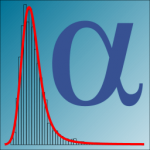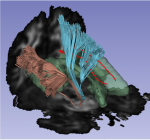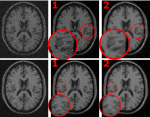Software
|
This WIP toolbox provides an object-oriented interface (OOI) to quaternions and dual quaternions, which are efficient and compact representations of rigid motions in 3D. This allows to work with quaternions as you usually work with real or complex numbers (or N-D arrays) in Matlab. Some basic utilities for robot kinematics are provided, though the OOI code may be used for image registration as well. |
Compressed sensing methods with motion estimation and compensation techniques have been proposed for the reconstruction of accelerated dynamic MRI. However, artifacts that naturally arise in compressed sensing reconstruction procedures hinder the estimation of motion from reconstructed images, especially at high acceleration factors. |
|
This code allows to exactly characterize the noise noise in 3D-GRAPPA (GeneRalized Autocalibrating Partial Parallel Acquisition) acquisitions with non-uniform undersampling patterns by a noise propagation analysis that operates directly in k–space. We exploit the extensive symmetries and separability into independent blocks in the reconstruction steps to take into account the correlation between all the acquired k–space samples. The code includes a script to reproduce the figures in [1]. |
This code allows to exactly characterize the noise noise in GRAPPA (GeneRalized Autocalibrating Partial Parallel Acquisition) acquisitions with non-uniform undersampling patterns by a noise propagation analysis that operates directly in k–space. We exploit the extensive symmetries and separability into independent blocks in the reconstruction steps to take into account the correlation between all the acquired k–space samples. |
|
Groupwise Registration method for 2D motion estimation over MR-CINE sequences. The local transformation is represented as a combination of B-spline Free Form Deformations (FFD). The intensities of the deformed images are obtained by linear interpolation. |
Basic MATLAB files for digital image processing. The toolboxes include: Image Quality Assessment: (QILV index), Local statistics toolbox, Soft thresholding for image segmentation and 2-D adaptive noise-removal filtering. |
|
This software implements a "joint" Wiener filter for DW-MRI images, meaning that the channels are filtered altogether to improve the estimation accuracy. Two versions are available in two different repositories: one with fast, efficient code (C++/ITK in nitrc) and one with comprehensive, intuitive code (Matlab in File Exchange). |
α-stable distributions are a family of well-known probability distributions. However, the lack of closed analytical expressions hinders their application. Libstable consists of an R package, a C/C++ library and a MATLAB front-end that permits fully parallelized, fast and high precision evaluation of density, distribution and quantile functions , random variable generation and parameter estimation of α-stable distributions in their whole parameter space. The library can be easily integrated on third party developments. |
|
Noise estimation and filtering MATLAB files. |
These codes allow estimating spatially variant noise patterns from magnetic resonance imaging (MRI) data. |
|
OpenCLIPER is an OpenCL-based framework for medical image processing and reconstruction. Its goal is to simplify OpenCL burdens to let developers focus on the real thing: OpenCL kernels. |
Diffusion-Weighted MRI often suffers from signal attenuation due to long TE, sensitivity to physiological motion, and dephasing due to concomitant gradients (CGs). These challenges complicate image interpretation and may introduce bias in quantitative diffusion measurements. Motion moment-nulled diffusion-weighting gradients have been proposed to compensate motion, however, they frequently result in high TE and suffer from CG effects. |
|
This code allows the computation of 2D and 3D shortest time of arrival maps given a local cost map and a mask with the initial front as inputs. A centered scheme with second order acuracy for the derivatives is employed, as well as a multi-stencil approach. Euclidean distance maps can be built with it by having the local cost be unitary on the whole domain. The software is stored in github It requires the ITK toolkit and Boost to build it. If you use this software, please include the following reference: |
This software contains the AMURA module for MATLAB, aimed at the analysis of single-shell, HARDI-like dMRI data sets. All the methods here presented are described in the following papers: |
|
Tractography based on globally optimal costs. Fiber tracts are estimated as the shortest path between seeds and targets, provided a local cost function is defined depending on the structure of the white matter. Several projects may be found here, including Gaussian (Riemannian) and non-parametric (Finsler) geodesics, both standalone and Slicer plugins available. ITK and VTK required. |
Detail Preserving Anosotropic Diffusion for Speckle Filtering (DPAD) |
|
This is an efficient implementation of the popular non-local means algorithm adapted to MR images. Filtered pixels are computed as weighted averages whose weighting factors depend on distances in a "features space" describing the high-level textures of the image. Both C++/ITK and Matlab versions are available. |
This is a toolbox designed for Matlab(R) and aimed at the computational analysis of diffusion MRI. It addresses basic concepts such as Diffusion Tensor Imaging, but also advanced topics like High Angular Resolution Diffusion Imaging (including estimation and representation of Orientation Distribution Functions), multi-shell samplings, and computational diffusion MRI. |


